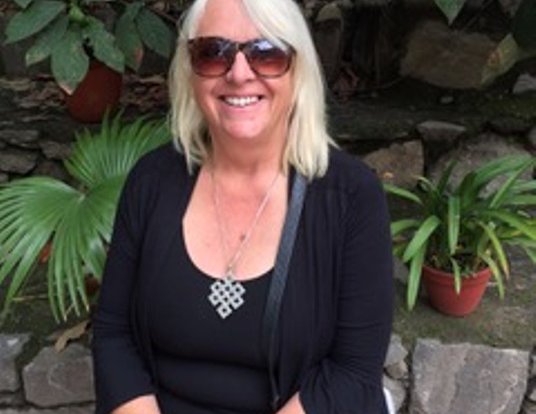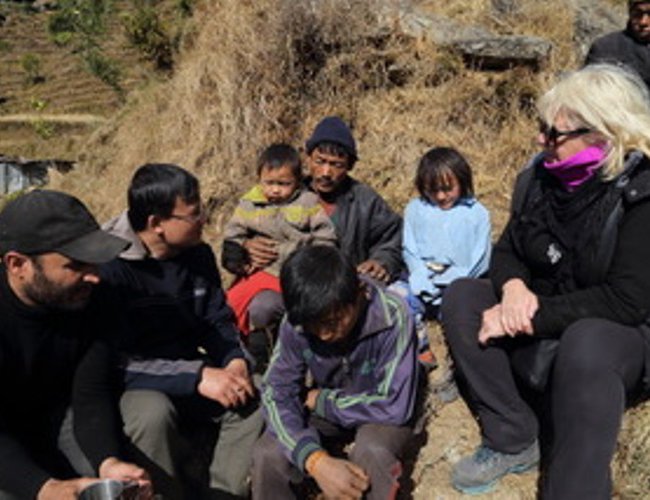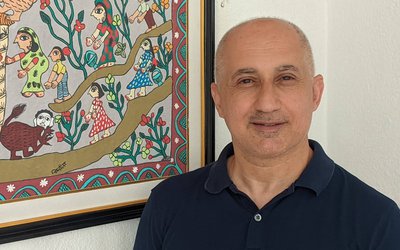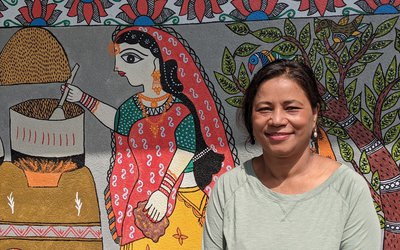
LINDA CRUSE is an international humanitarian aid worker guided by the philosophy of 'trade, not aid'. She follows a 'hand up', not a 'hand out', approach, which means that everything she does in areas that have faced catastrophic disasters is to empower the people to be economically stable and independent. She is also an author, a senior fellow at Canterbury University in New Zealand, motivational speaker and personal development trainer. Linda Cruse spoke to ADITI ARYAL on various issues. Excerpts:
What are some of the good works you have done in Nepal? What obstacles did you face?
After the earthquake, I have worked in a number of affected areas, including Thangdor, which lies on the Tibet-Nepal border. I have faced no obstacle in Nepal. I believe it is more about the way we approach working in a country which keeps us obstacle-free. My approach has been engaging with the local communities, village elders, youth leaders, and healthcare assistants. I engage people from the business world within and beyond the country to help me.
In Thangdor, this was possible by finding a gap in the market, which also had a market value for the people, like growing bamboo. Bamboo can be used to make and sell furniture, stop landslide, and its shoots can be consumed as nutritious foods. We have also started a honey and an apple growing projects. We are looking for an easy income generating solution for the local people by ensuring a good market value.
You stress on the involvement of private sector in the humanitarian work. What is the scope for the same in an emerging economy like Nepal?
I feel the 'Corporate Social Responsibility’ is an associated connection, with a burden, an unfair, maybe even unrealistic obligation on a company, and often results in quick fix cheque writing with a swift hand over of the required responsibility.
Seventeen years ago I flipped the CSR approach on its head and introduced CSO - Corporate Social Opportunity, recognizing the long term opportunities of an investment of engaging more creatively and actively in community support, resulting in mutual benefits for the company, employee and community. There are many ways that industry can create a win- win situation both for the company and the community.
How does the CSR work?
An example of CSO is an initiative I worked on in Pakistan in remote rural communities to develop the milk industry. Pakistan is the world’s sixth largest producer of milk, but most of it is produced in small rural communities. Teaming up with one of the country’s main dairies we arranged for training on better milk-producing methods, including care of their livestock and simple storage practices, in turn guaranteeing them the daily sales in cash. The results were immediate with both the dairies and the communities profiting financially from the arrangement. Community funds were then invested, by their choice, in medical services, school teachers and any equipment that the village decided was required.
How do you see your products?
One of the products we have just started is a honey bee project in Thangdor, with the right unique flavor and great marketing it has the potential to be a best selling product in the world and maybe we can sell it in Harrods in London! Nepal and India share a border where some of the best tea in the world is produced. Why does Nepal not share the same and income from it? I believe that within Nepal there are many things that have a global market can be produced.
How important has the role of youth been in the implementation of your projects in Nepal as well as globally?
The role of youth is undoubtedly important. For many years I have engaged the private sector to help solve seemingly intractable problems in development work. They bring mature, experienced brain, entrepreneurial skills and business acumen. But even the best mature business brain can slip into what they expect will work or won’t work. When we engage youth, we harness the passionate unfettered un-programmed brain where everything seems possible. The youth are the future and if you ignore youth, you ignore the future. So my model engages both the mature experienced brain with the young un-programmed brain and that’s where the magic happens.
Throughout the time you've been in Nepal, has there been any
obstacle that you have faced because of the political situation here or any
politically affiliated individual or group?
I have never been affected by the political scenario of Nepal. Governments have their ups and downs in every country I have worked in, even in the UK or the US. Governments have a very difficult, complex, job to do and they do the best they can. I believe it is up to every individual to take the responsibility for the well-being of the country. The more we organize ourselves in a community, the stronger we become. If we take that responsibility and organize ourselves we do the best for our lives and for our friends and family.
If you had to sum up your journey briefly and give a couple of concrete advice to the people of Nepal what could it be?
Be proud of your country and people. I have travelled to literally every continent and Nepal is the most uniquely special country I’ve been in, lived in, travelled in and had the honor to serve in and contribute to. I think you have to be more outward in who you are and what you are. Encourage other people to visit Nepal not just for the tourism, but for spirituality too. The great philosophies and other things people are interested to learn about have come from Hinduism and Buddhism. There is so much to develop apart from adventure sport and mountain climbing. Shine your light a bit more and let the world know about you in many different ways. Whatever Nepal has gone through, including the Maoist insurgency or the hard emotional years with the royal family massacre, people still come here. Nepal is a jewel in so many ways!


- Women Empowerment
- Mar 04, 2019
- Can We Escape The Corset?
- Dec 24, 2018
- Do We Need an International Men’s Day?
- Nov 23, 2018
- MeToo Gained Momentum
- Nov 03, 2018
- Are We Fighting Rape Incorrectly?
- Sep 22, 2018

















